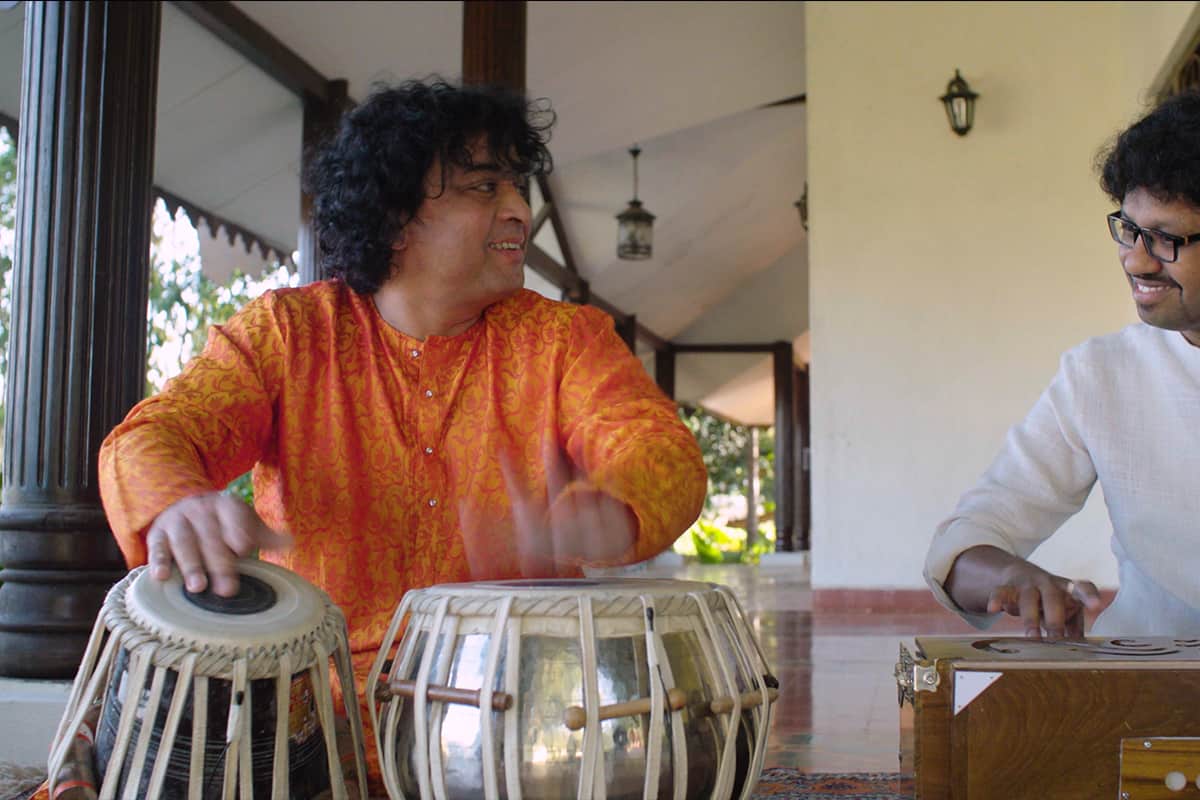This year the Darbar Festival hosted Supreet Deshpande for his UK debut tabla solo, a rare occurrence. The audience was treated to an exploration of traditional rhythmic patterns. A third-generation proponent of the Delhi-Farukhabad gharana, Supreet was initiated into the art form by his father at the tender age of 3. He remained under his father Pandit Kiran Deshpande’s tutelage for twenty years and subsequently studied under Pandit Suresh Talwalkar whose style draws from several gharanas. Deshpande’s own varied repertoire reflects this and incorporates compositions from gharanas including Ajrara, Lucknow, Benares and Punjab, without compromising the depth or creativity of his artistry. Accompaniment was provided by Milind Kulkarni on the harmonium, a reputed accompanist and a musician of exceptional calibre. Milind’s natural talent has been honed since the age of 7. Possessed of an uncommonly extensive knowledge of ragas coupled with a natural musicality, he is able to combine intricate phrases and notes to produce complex yet aesthetic melodies.
‘Rhythm is a universal language’
It was with this emphasis on unity and connection that Supreet Deshpande opened the show. He reflected on what a solo showcase is and stated that, essentially, it could be nothing of his own. Rather, he sees himself as a channel for a 700 to 800-year tradition that he has been fortunate enough to imbibe. This idea of unification through transmitting tradition was prevalent through the concert as the audience came together to experience a cross-section of this great heritage, across geography and time.
It seems worth expanding briefly on the rich historical tradition of the tabla. Over time the North Indian rhythm system has come to possess innumerable talas (time cycles), which are rendered using countless phrases (bols). In the creative combination of different phrases, a very complex and sophisticated body of rhythmic patterns has evolved. An extremely versatile drum, possessing both a rhythmic and melodic aspect, it is used for various kinds of accompaniment, collaboration and more recently even as a solo instrument.
The showcase began as he launched into a playful yet powerful uthan (act of rising) and then peshkaar (presentation): a mathematical interplay of bass (bayan) and treble (dayan) in teental (16-beat cycle), picking up speed and culminating in an explosive tehai (rhythmic cadence). Supreet went on to play various kaidas (fixed compositions) and relas (extremely quick pieces) from various gharanas including Delhi and Benares. Notable ones included a composition by the renowned Pandit Kishan Maharaj, ‘one of the mathematical geniuses of India’. The speed with which he could produce such an array of sound was astonishing. He moved on to present a Lucknowi challan (walk); the aim of this was to convey the delicacy and sophistication of Lucknow rhythms of life. He then performed various gats of exceptional beauty. Gats are poetic, cyclical forms that originated in the kathak dance repertoire and attempt to convey motion. The audience was also treated to an experimentation with conventional laggi forms (a fast lively style of playing tabla bols), where Supreet incorporated lesser-used phrases into this format.
In addition to experimentation, Supreet habitually includes rare traditional bandishes (compositions) in their original forms in his recitals as his contribution towards their preservation. This performance was no different, as the audience was presented with indescribably beautiful pieces by many greats through history, including Ustad Feroze Khan Sahib, Ustad Ali Hussein Khan, Pandit Samta Prasad and Ustad Allarakha. A stand-out piece was a Bedum Kamali Chakradar composed by Ustad Zakir Hussein – a tihai with no pauses in-between the three sections, aurally striking but also mathematically astounding in its achievement. Also noteworthy was Ustad Habibuddin Khan’s manipulation of a 4/4 beat cycle into 3.5/4.5. He also played some special series of compositions in remembrance of his father, known as ‘aadhart’ where conclusion happens just before the sam. He also made sure to pay homage to Pandit Suresh Talwalkar, sharing some extremely special and ancient 150-year-old gems.
Supreet Deshpande is an artist of exceptional stature and his demonstration incorporated everything that is exciting about the tabla, from knowledge and technical wizardry of complicated composition to aesthetic and mathematical creative expression. He certainly makes this age-old art form relevant and accessible today through his ability to connect with the audience. Add to this the meticulous melodic and rhythmic punctuation of Milind Kulkarni and we had a performance that was nothing short of exuberant: an encounter that propelled one into the moment – a unique and enriching experience for the enthusiast and neophyte alike.
